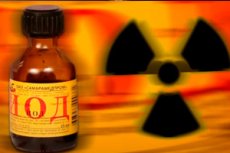Medical expert of the article
New publications
Iodine vapor poisoning
Last reviewed: 29.06.2025

All iLive content is medically reviewed or fact checked to ensure as much factual accuracy as possible.
We have strict sourcing guidelines and only link to reputable media sites, academic research institutions and, whenever possible, medically peer reviewed studies. Note that the numbers in parentheses ([1], [2], etc.) are clickable links to these studies.
If you feel that any of our content is inaccurate, out-of-date, or otherwise questionable, please select it and press Ctrl + Enter.

Iodine is a vital element for humans, as it takes part in metabolic processes. Deficiency of this substance, as well as its excess negatively affects the body. Intoxication with iodine and its vapors is particularly dangerous.
The main routes of poisoning:
- Oral use of external medications.
- Drug overdose.
- Self-treatment without consulting a specialist.
If iodine is taken orally, it will cause damage to the mucosa of the digestive tract. The severity of damage to the body depends on the concentration of iodine in the solution used. Consumption of more than 2 g of pure crystalline substance is fatal.
No less dangerous is inhalation intoxication, i.e. Poisoning by vapors of the substance. When it is inhaled, inflammation of the respiratory tract occurs, and burns appear on the mucosa.
Symptoms of the iodine poisoning
The main symptoms of iodine vapor damage include:
- Dry cough.
- Tears.
- Runny nose.
- Headache and dizziness.
- Burning and itching in the nose.
- General weakness.
- Hoarseness of voice.
- Shortness of breath.
- Shortness of breath.
The symptomatology of the lesion depends on the route of entry of the toxin into the body. Symptoms can be acute or have a chronic character. In some cases, the main sign of pathological reaction is anaphylactic shock.
If iodine has gotten inside, it causes these symptoms:
- A sharp burning sensation in the throat.
- Shortness of breath.
- The oral cavity is colored brown.
- Bouts of nausea and vomiting.
- Sharp pain in the abdomen.
- Strong iodine breath odor.
- Diarrhea with blood.
- The taste of metal in my mouth.
Such symptomatology requires immediate medical attention.
Systemic exposure to vapors of the substance causes significant harm to health and is manifested by such signs:
- Disorders on the part of the cardiovascular system.
- Urinary disorders.
- Feverish condition.
- Severe thirst and swelling.
- Hallucinations, coma.
Chronic iodine poisoning is called iodism. Most often this problem is faced by people who work in industries with large volumes of halogen. Intoxication is also possible with prolonged drug therapy with iodine preparations.
Another pathology that can be provoked by prolonged contact with iodine is a dermatological disease - iodododerma. The disease is manifested by acne, dermatitis, urticaria. The affected person may have damaged eyeballs, develop inflammatory processes (conjunctivitis, blepharitis).
Treatment of the iodine poisoning
Treatment depends on the severity of damage to the body. Antagonist is a soda solution (2 tsp. Per glass of water), it neutralizes the action of iodine, but is effective only in the initial stages of poisoning. The solution is rinsed in the mouth and inhaled. It is also recommended to breathe ammonia. If the symptoms are acutely pronounced and the condition of the victim rapidly deteriorates, it is necessary to seek professional medical help. Doctors conduct detoxification therapy and prescribe drugs for dehydration. If the substance has damaged the mucosa of the respiratory tract or internal organs, oxygen inhalations are indicated.

